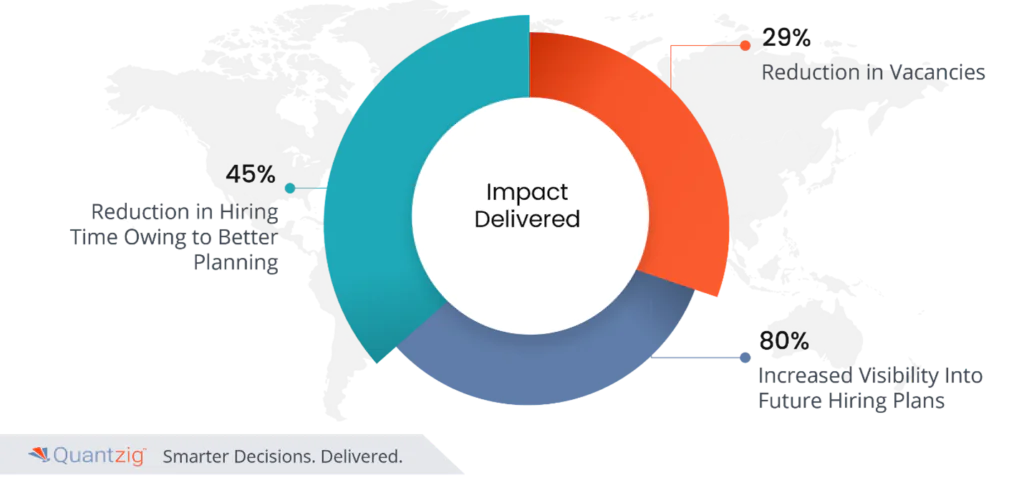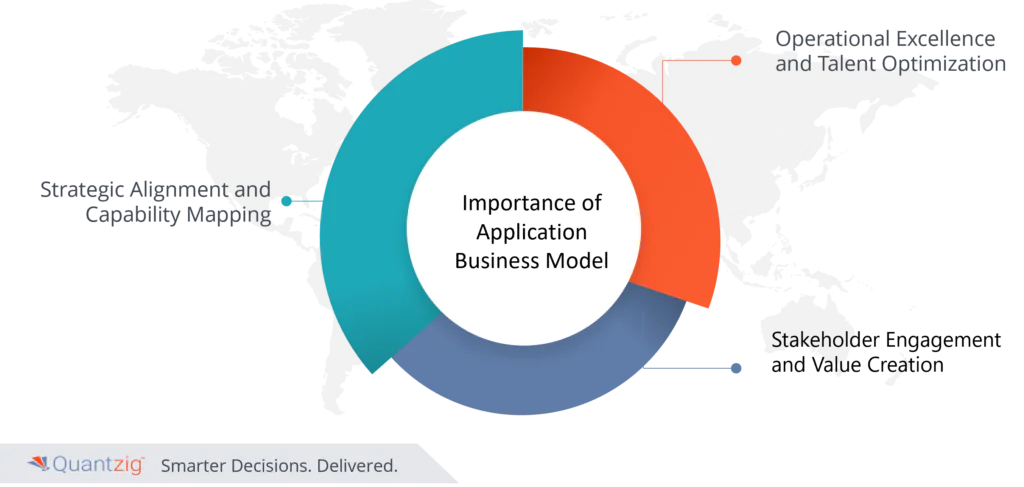In the fast-paced realm of logistics, agility and foresight are paramount for sustaining growth and maintaining competitive advantage. Recognizing the imperative need to anticipate future skill requirements amidst rapid industry evolution, Quantzig collaborated with a leading logistics unicorn to identify key competencies essential for future business growth. Leveraging advanced application business model and industry expertise, Quantzig embarked on a comprehensive assessment, analyzing market trends, technological advancements, and organizational objectives to pinpoint critical skills and capabilities pivotal for navigating forthcoming challenges and opportunities.

Table of Contents
The importance of application business model to Identify Key Skills Required for Future Business Growth

The application of a well-defined business model is instrumental in strategically identifying key skills required for future business growth, serving as a foundational framework for talent optimization and organizational success.
- Strategic Alignment and Capability Mapping:
A robust business model facilitates strategic alignment by defining organizational objectives, core competencies, and growth trajectories. By delineating key value propositions and market opportunities, businesses can identify essential skills and competencies needed to capitalize on emerging trends, technological advancements, and market shifts, ensuring alignment with future growth objectives.
- Operational Excellence and Talent Optimization:
An effective business model promotes operational efficiency by optimizing processes, fostering innovation, and enhancing productivity. By identifying critical skills gaps, leveraging data-driven insights, and aligning talent strategies with strategic imperatives, organizations can cultivate a skilled workforce capable of driving innovation, adapting to change, and fueling sustainable growth in a competitive landscape.
- Stakeholder Engagement and Value Creation:
A comprehensive business model fosters stakeholder engagement by delivering tangible value to customers, investors, employees, and partners. By prioritizing customer-centricity, fostering strategic partnerships, and aligning talent development initiatives with business objectives, organizations can enhance stakeholder satisfaction, attract top talent, and build a resilient ecosystem that drives long-term success and sustainability.
In essence, the application of a well-defined business model transcends traditional frameworks, empowering organizations to proactively identify key skills required for future business growth, optimize talent management strategies, and capitalize on emerging opportunities in a dynamic and competitive marketplace.
Summary
Client Details: Quantzig partnered with a leading logistics unicorn based in India to address their need for identifying key skills required for future business growth.
Challenges: The client faced challenges with their aggressive hiring at the beginning of their venture that did not align with the expanding business. They failed to consider the scope of the future business plan and hence didn’t rationalize their hiring and training decision to align with future business expansion.
Solutions: Quantzig’s solution involved constructing a framework to identify factors related to business expansion and building a skillset requirement matrix based on the current business expansion plan. Additionally, advanced application business model using the Markov principle were developed to predict expansion probability and approximate future skill requirements. This enabled the client to make informed work skill requirement predictions and optimize their hiring and training strategies for sustained growth.
Impact Delivered
All of the above initiatives resulted in:
- 45% Reduction in hiring time owing to better planning
- 29% Reduction in vacancies
- 80% Increased visibility into future hiring plans
About the Client
- Our recent client was a leading B2B logistics unicorn based out of India with more than $200 million in market capitalization. The client had multiple practice divisions like Pharma, metals, FMCG, F & B, etc.
- As the expansion started, the logistics unicorn faced significant challenges due to its aggressive hiring strategy for specific roles at the beginning of the venture. The rapid growth in the business led to a strain on the company’s resources and infrastructure.
- The logistics unicorn struggled to maintain operational efficiency and meet the increasing demands of its diverse practice divisions. The company’s initial hiring spree resulted in a lack of alignment between departments and a shortage of specialized talent in crucial areas.
Challenges
- The client’s decision to engage in extensive hiring initially proved fruitful, leading to a significant influx of business opportunities and rapid growth. The expanded workforce enabled them to handle the increased demand and deliver results. However, as the business continued to expand, new roles and responsibilities emerged, accompanied by evolving skill set requirements. This presented a challenge for the client, as their existing workforce may not have possessed the specific expertise and capabilities necessary to meet the demands of these new roles. The rapid growth outpaced the skill sets within the organization, creating a gap between the talent available and the talent required. This gap hindered the client’s ability to sustain the same pace of growth and effectively execute new business initiatives.
- Unfortunately, the client’s failure to anticipate the full scope of their future business plan proved to be a crucial oversight. This lack of foresight led to their inability to rationalize their hiring and training decisions in a manner that aligned with their future business expansion. By neglecting to consider the potential trajectory of their business and the associated skill set requirements, the client encountered significant challenges when faced with the need for new roles and responsibilities. The absence of a strategic approach to talent acquisition and training hindered their ability to adapt and scale effectively as the business expanded.
- To address the challenge they faced, the client needed a solution that could operationally resolve the challenge and provide insights on future resourcing and training plans. Recognizing the importance of accurate work skill requirement prediction, the client aimed to leverage advanced analytics and forecasting techniques to anticipate the evolving skill sets needed for their expanding business. They sought a comprehensive system that could analyze market trends, business projections, and industry demands to predict the specific work skills that would be in high demand in the future.
Solutions
- Quantzig, a leading analytics firm, took the initiative to construct a robust framework designed to identify the key factors associated with business expansion. This framework allowed the client to gain a comprehensive understanding of the resource skill set needed to effectively support and sustain their growing business operations. By leveraging data-driven analysis and industry expertise, the framework enabled the client to identify the specific skills, competencies, and expertise required for each stage of their business expansion journey. It took into account various factors such as market trends, customer demands, technological advancements, and competitive landscape. Quantzig’s contribution empowered the client to proactively address resource skill set needs, optimize their hiring and training strategies, and enhance their overall organizational performance.
- Further, we built a skillset requirement matrix by role type based on the current business expansion plan. This skillset requirement matrix was designed to provide a detailed breakdown of the specific skills and competencies needed for each role type within the organization. By leveraging this matrix, the client was equipped to make well-informed decisions regarding resourcing, hiring, and training, ultimately fostering a more efficient and effective workforce to support their business expansion plan. We conducted thorough analyses and consultations to determine the precise skill sets required for different roles in alignment with the client’s expansion goals. It allowed the client to identify the necessary qualifications, technical proficiencies, and domain knowledge required for each role.
- Advanced application business model was built using the Markov principle to predict the probability of expansion in different areas and approximate the skill requirement for future months. We utilized these models to approximate the future skill requirements, enabling the client to proactively plan their workforce strategies. The analytics models considered various factors such as dynamics, industry trends, and historical data to generate accurate predictions. By integrating the Markov principle into their work skill requirement prediction framework, we enabled the client to anticipate the specific skills and competencies that would be in high demand in the coming months. This allowed the client to optimize their recruitment, training, and resource allocation efforts to meet the evolving needs of their expanding business effectively.
In conclusion, Quantzig’s strategic partnership with the leading logistics unicorn yielded invaluable insights into the key skills required to fuel future business growth and innovation. By leveraging advanced analytics and industry-specific expertise, we empowered the organization to proactively align its talent strategy with evolving market dynamics, technological advancements, and strategic imperatives. This transformative collaboration underscores our commitment to driving excellence, fostering innovation, and equipping organizations with actionable insights to navigate complexities, capitalize on opportunities, and achieve sustainable growth in a dynamic and competitive landscape. Through this partnership, the logistics unicorn is well-positioned to cultivate a skilled workforce, optimize operational efficiency, and capitalize on emerging trends, reaffirming its leadership position in the industry.


